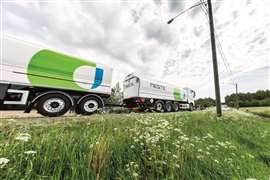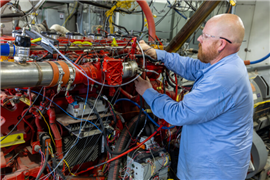Read this article in Français Deutsch Italiano Português Español
Newsmaker of the Year: Decarbonization for the win
16 December 2024
After HVO takes the nod in 2023, a broader industry push for reduced carbon emissions has brought us to this year’s winner.
Back in 2023 – which might seem like yesterday or a decade ago, depending on how your year has been – we selected HVO, or renewable diesel, as our Newsmaker of the Year. The choice was largely due to the benefits of this ‘alternative’ fuel, its flexibility as a drop-in replacement for fossil diesel and the product’s overall carbon neutrality.
HVO plays heavily on its sustainability credentials to gain market share, but it’s not alone. Name virtually any product pitched to the wider power industry and it’s likely the marketing literature will focus on sustainability. How a product reduces its environmental impact over previous versions and market competitors is critical to the buying decision.
It’s because of this focus on sustainability that this year we’ve taken one, possibly even two steps beyond HVO and chosen decarbonization as our 2024 Newsmaker of the Year.
Peak Efficiency
In many instances, decarbonization is presented as sustainability, but no matter how it is pitched sustainability is driven in large part by technology intended to deliver decarbonization. Such is the importance of decarbonization that it was the lead topic of presentations delivered at this year’s Power Progress Summit in Chicago.
 Image: Jasinski via Adobe Stock. Generated with AI.
Image: Jasinski via Adobe Stock. Generated with AI.
Beyond this gratuitous self-promotion, a quick look at the most viewed stories on the Power Progress site over 2024 highlights the interest in decarbonization and the routes to achieving a low-carbon future.
In April, Weichai Power unveiled a diesel engine with a 53.09% thermal efficiency. The China-based engine OEM, which also owns Baudouin, has a track record of such achievements; this was the fourth time the company had broken the diesel engine thermal efficiency record.
Internal combustion creates a lot of heat, which is effectively wasted energy. Reducing that heat output should result in a greater percentage of fuel being used to produce engine power, which in turn reduces fuel consumption and emissions.
Diesel tech, though, is clearly approaching peak efficiency with these numbers. To achieve this new record, the R&D team at Weichai Power leveraged a series of cutting edge features, including high-expansion combustion, mixed-flow pressurization, super high-efficiency fuel injection and friction-reducing techniques. Whether any of these features will make their way into the volume engine market remains to be seen.
HELM Launch
While the Weichai project highlights how peak engine efficiency can deliver performance gains, a series of new engine launches over the year have championed decarbonization. This includes the ‘fuel agnostic’ engine series produced by Cummins, which will see an all-new engine platform fitted with fuel-specific heads supporting diesel/HVO, natural gas (methane), CNG/LNG or hydrogen.
The range is now formerly branded as HELM, which loosely stands for higher efficiency, lower emissions and multiple fuels. Speaking about the series, Beau Lintereur, executive director of Off-Highway, noted: “We’re all chasing new technology that will get us to zero carbon, but at the same time we’re investing in internal combustion tech.”
The Next Generation X15 has been developed as part of the HELM program. Lintereur said that Cummins had launched the engine to allow machine OEMs to develop products compliant with the upcoming engine emissions standards. “We don’t need to bring this product to market now. While it’s rated to Stage 5/Tier 4, and also supports other emissions levels, this engine will be compliant with the next wave of emissions standards.”
Meeting Standards
Decarbonization clearly looks good on paper, but it is these tighter emissions standards and the legal requirement to meet or exceed those standards which are the driving force behind much of the related technology.
And that carries over into areas other than internal combustion, with diesel/battery hybridization now being revisited by a series of companies to help reduce related emissions, particularly in the on-highway space.
Whether its billed as sustainability or decarbonization, these regulations will set targets for future emissions reductions. But they will also help with corporate social responsibility, achieving self-imposed net zero targets. While some say that net zero is an unachievable fallacy, there’s certainly no harm in attempting to achieve those goals.
Editor’s Note: This story originally appeared in the October - December 2024 issue of Power Progress International.
POWER SOURCING GUIDE
The trusted reference and buyer’s guide for 83 years
The original “desktop search engine,” guiding nearly 10,000 users in more than 90 countries it is the primary reference for specifications and details on all the components that go into engine systems.
Visit Now
STAY CONNECTED




Receive the information you need when you need it through our world-leading magazines, newsletters and daily briefings.
CONNECT WITH THE TEAM














